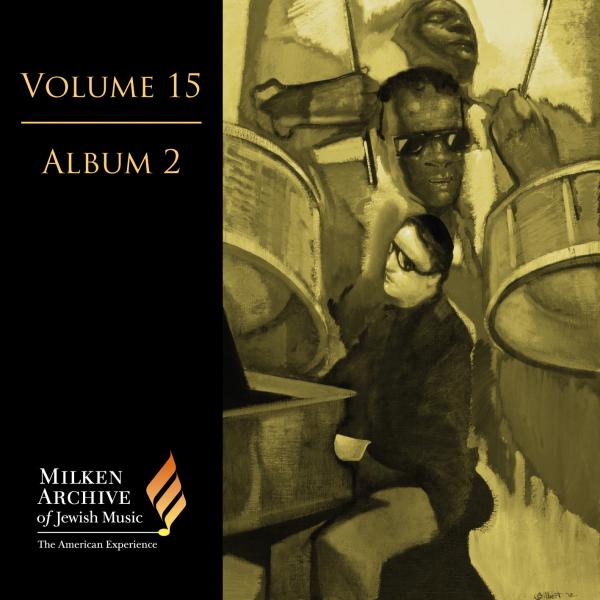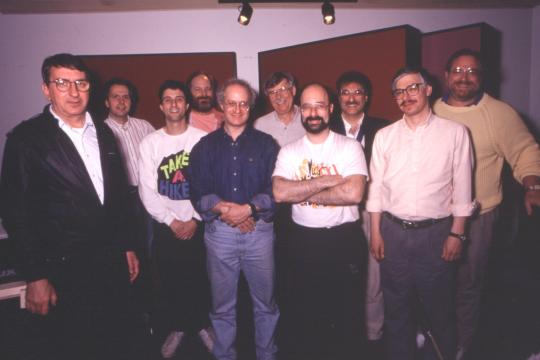Tracks
Track |
Time |
Play |
| Blessing Over the Candles | 01:59 | |
| Ma tovu | 02:48 | |
| Bar'khu | 02:33 | |
| Sh'ma yisrael | 03:27 | |
| Mi khamokha–May the Words of My Mouth | 03:58 | |
| Kiddush | 02:59 | |
| Torah Service | 04:04 | |
| Adoration | 02:17 | |
| Psalm 150 | 02:00 |
Liner Notes
Jonathan Klein began experimenting with syntheses of Hebrew liturgy and jazz during the 1960s. “To my sensibilities,” he has recalled, “Judaism and jazz seemed to go together quite naturally.” In 1965, while he was an active member of the Reform movement’s youth organization, NFTY (North American Federation of Temple Youth), Hear O Israel: A Sabbath Service in Jazz was performed at Reform synagogues throughout the Northeast by a quintet consisting of Ellen Gould, Debra Miller, Lawrence Breitbord, Alan Sher—all members of the Temple Emanuel branch of NFTY—and Klein himself at the piano. In 1967, he revised the service for a slightly larger ensemble, in which form it was performed a few times and, with NFTY’s support, recorded by an all-star jazz ensemble that included a trio with Herbie Hancock on piano, Ron Carter on bass, and Grady Tate on drums. In addition to the written score, the trio improvised on introductions (to mi khamokha and to the Torah service), and Herbie Hancock improvised an interlude within what is called—in the classic Reform parlance of the old Union Prayer Book—the “Adoration.” For a long time the master of that limited-edition recording disappeared from the market. Still, apart from the sections performed by the trio—and despite the participation of other fine jazz musicians in the other sections—Klein felt that the choral singing sounded too “classical” in style and that a more jazz-oriented vocal approach was needed. In 1992, he made yet a third version of the service, in anticipation of the Milken Archive recording, which included two female and two male singers, two woodwinds, trumpet, flügelhorn, trombone, piano, bass, and drums.
These recorded excerpts of the final version and edition (1992), together with the improvisations taken from the 1967 recording, represent the composer’s intentions, concept, and artistic vision to his enthusiastic satisfaction. “As a teenager,” he reminisced recently, ”there were sounds in my head that I just didn’t know how to let out and onto paper so that they could be performed. Twenty-five years later, with the help of some fine musicians among Berklee faculty and students, it became possible. There should be a b’rakha for being given the chance finally to more or less get something right!”
These recorded excerpts also reflect faithfully the natural affinity Klein perceived in the 1960s between the improvisatory natures of two otherwise distinct art forms: jazz and cantorial tradition. He was particularly intrigued by the idea of continuous creativity in relation to performance. His own thoughts about the work help us better to appreciate it:
The ritual act of creating this music during worship (i.e., improvisation) seemed most appropriate for the Sabbath, when each week, according to Jewish mystical traditions, we re-create the world. While I was not suggesting that this style or mode replace nusaḥ hat’filla [the traditional Ashkenazi prayer modes] as the main musical diet for Jewish worship, I did feel that its occasional use added a unique spirituality to the worship service.
Klein saw jazz improvisation’s potential as a spiritual act, in as much as individual performers have the opportunity to create something on the spot, ad libitum. They are thus able to express inner thoughts and feelings while at the same time relating to a supporting ensemble:
The risks involved—the fact that no two performances are ever exactly the same—can heighten the sense of the moment, and sometimes lead to beautiful artistic expression. I feel the job of the composer in this situation is to provide a framework in which this can happen.
Of course, the same observation about the uniqueness of each performance could—and should—apply equally to traditional cantorial art, which is highly improvisatory by nature. The two vocal styles, timbres, and modalities, however, differ radically from each other. Klein describes the vocal style in his work as that of a mainstream modern jazz vocal group “somewhere between 1948 and the present.” The vocal lines are structured like melodies played by the jazz instrumentalists. “These are not melodies one could expect a congregation to sing or even listen to on a regular basis,” he has reflected. “Rather, by being presented with a very personal spiritual experience, a congregant might also feel encouraged to explore his or her personal relationship to prayer. I hope that at least a few listeners can find new appreciation for familiar texts in a different but honest musical setting.”
When Klein’s service was first performed at his father’s congregation in Worcester in 1969, there was, as he has recalled, very little neutral reaction. “The congregants either loved or hated it,” and the innovation of using jazz to frame the prayers to which they were accustomed ignited strong reaction. But Klein notes that when the service was performed twenty-five years later at Temple Sinai in Sharon, Massachusetts, it was generally well received—in part because expectations had evolved. By then, “it provided zero shock value.”
With the hindsight of more than forty years, Klein still feels that his initial concept—and the rationale behind the combination of jazz and Jewish worship—was valid. But he sees his motivation as more spontaneous than academic. “I was immersed in the vocabulary of jazz at the time. Musically, it was the only language I could speak. To put it simply, this was how the words—including the eloquent English portions of the old Reform Union Prayer Book—sang to me.” There could, of course, be no more honest motivation from liturgical or artistic perspectives.
Lyrics
Sung in Hebrew and English
BLESSING OVER THE CANDLES
Praised be You, O Lord, King of the universe, who has made us holy through His commandments, and who has commanded us to kindle the Sabbath lights.
MA TOVU
How lovely are your dwellings, O House of Israel.
O Lord, through Your abundant kindness I enter Your house
and worship You with reverence in Your holy sanctuary.
I love Your presence in this place where Your glory resides.
Here, I bow and worship before the Lord, my Maker.
And I pray to You, O Lord, that it shall be Your will
to answer me with Your kindness and grace,
and with the essence of Your truth that preserves us.
BAR'KHU–SH'MA YISRA'EL
Praised be the Lord, to whom all praise is due.
Praised be the Lord, who is to be praised for all eternity.
Listen, Israel! The Lord is our God.
The Lord is the only God—His unity is His essence.
(Our God is One; our Lord is great; holy is His name.)
MI KHAMOKHA–MAY THE WORDS OF MY MOUTH
Who is comparable to You among the heavenly creatures, Oh Lord? Whose glorious holiness is like Yours? Your awesomeness is reflected in the praises we chant to You. At the shore of the Sea of Reeds the newly delivered Israelites sang praises to Your Name; all of them with one voice offered their thanksgiving, proclaiming Your majesty, saying, “The Lord shall reign for all eternity.”
May the words of my mouth, and the meditations of my heart be acceptable in Thy sight, O Lord my Rock and my Redeemer. Amen.
KIDDUSH
Translation from the Hebrew by Rabbi Morton M. Leifman.
Praised be You, O Lord, our God, King of the universe, who has sanctified us through His commandments and has taken delight in us. Out of love and with favor You have given us the Holy Sabbath as a heritage, in remembrance of Your creation. For that first of our sacred days recalls our exodus and liberation from Egypt. You chose us from among all Your peoples, and in Your love and favor made us holy by giving us the Holy Sabbath as a joyous heritage. Praised are You, O Lord, our God, who hallows the Sabbath.
TORAH SERVICE
Lift up your heads, O ye gates, and be lifted up, ye everlasting doors, that the King of Glory may come in. Who is the King of Glory? The Lord of Hosts, He is the King of Glory. Let us declare the greatness of God, and render honor unto the Torah. O house of Jacob, let us walk I the light of the Lord. Hear, O Israel! the Lord our God–the Lord is One.
ADORATION
Union Prayer Book 1940
Let us adore the ever living God, and render praise unto Him who spread out the heavens and established the earth, whose glory is revealed in the heavens, above, and whose greatness is manifest throughout world. He is our God; there is none else. We bow the head in reverence and worship the King of Kings, the Holy One, praised be He!
PSALM 150
Hallelujah, hallelujah.
Praise God in His sanctuary.
Praise Him in the sky His stronghold.
Praise Him for His mighty acts.
Praise him for His exceeding greatness.
Praise Him with blasts of the horn.
Praise Him with harp and lyre.
Praise Him with timbrel and dance.
Praise Him with lute and pipe.
Praise Him with resounding cymbals.
Praise Him with loud, clanging cymbals.
Let all that breathes praise the Lord.
Hallelujah, hallelujah.
Credits
Composer: Jonathan KleinPerformers: April Arabian, Vocal Soloist; Greg Badolato, Tenor Saxophone, Woodwinds; David Clark, Bass; Tommy Kamp, Vocal Soloist; Tony Lada, Trombone; Kira McConaghy, Vocal Soloist; Mark Pinto, Soprano/Alto Saxophone, Woodwinds; Herb Pomeroy, Trumpet, Flügelhorn; Michael Rendish, Piano; Robert Stoloff, Drums; Dennis Williams, Vocal Soloist
Sh'ma, Mi khamokha and Torah Service: Herbie Hancock, piano; Ron Carter, bass; Grady Tate, drums
Adoration: Herbie Hancock, piano solo



